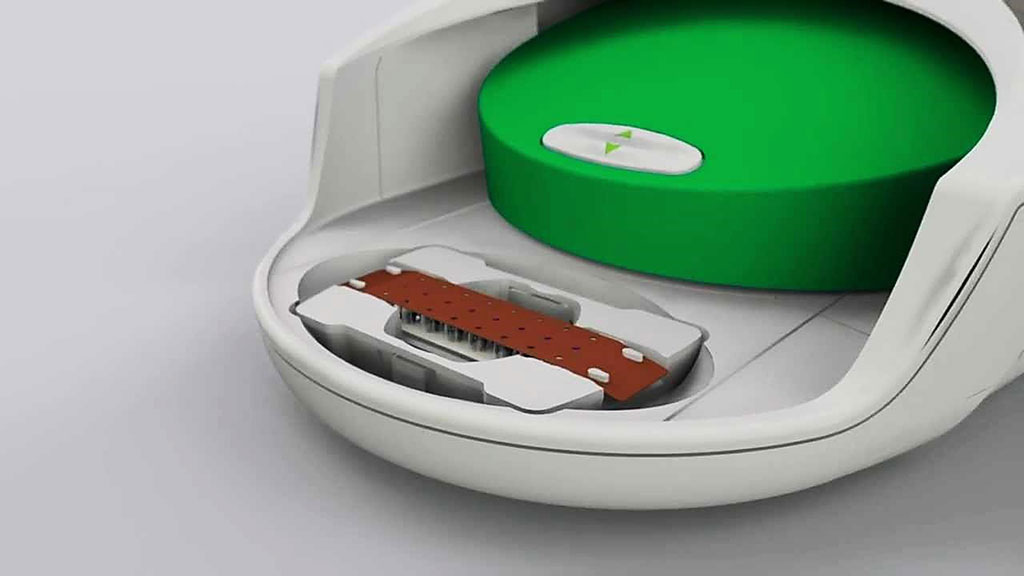Click Chip’ Detects Early-Stage Liver Cancer Biomarkers in Extracellular Vesicles
By LabMedica International staff writers
Posted on 21 Sep 2020
Hepatocellular carcinoma (HCC) is the fourth most common cause of cancer-related deaths worldwide. The poor prognosis of HCC can be attributed to the fact that diagnosis is often made at a late stage in disease development.Posted on 21 Sep 2020
Earlier detection of HCC is critical to reducing high HCC mortality rates, as potentially curative therapeutic interventions are available to treat early-stage HCC. The development of noninvasive diagnostics for early-stage HCC may significantly benefit cirrhotic patients at risk for developing HCC.

Image: The QX200 droplet digital polymerase chain reaction (ddPCR) instrument (Photo courtesy of Bio-Rad).
A team of scientists from the University of California, Los Angeles (Los Angeles, CA, USA) developed an HCC extracellular vesicles (EV) purification system (called EV Click Chips) by synergistically integrating covalent chemistry-mediated EV capture/release, multimarker antibody cocktails, nanostructured substrates, and microfluidic chaotic mixers. The Click Chip platform comprises a custom microfluidic chip that integrates tetrazine antibody (Tz)-grafted silicon nanowire substrates with a network of microchannels altered to induce chaotic mixing. To perform biorthogonal ligation-mediated capture, the team grafts trans-cyclooctene (TCO)-modified capture antibodies to EVs in a liquid sample, such as blood or urine. When the sample runs through the chip, the Tz and TCO react and bind to the EVs.
The group then injected 150-μl plasma samples into EV Click Chips from a cohort of 153 patients, including 46 treatment-naïve HCC patients and a control group that included patients with liver cirrhosis, chronic hepatitis B/C without liver cirrhosis, other cancers with or without metastasis, and healthy donors. After immobilizing HCC-specific EVs on the Click Chip platform, the team then eluted the targeted EVs out of the chips.
To avoid signals from non-HCC-specific EVs, Tseng's team detected and quantified HCC EV-specific gene expression after extracting mRNA by lysing collected EVs from the plasma samples. After running a customized panel using the QX200 ddPCR instrument, (Bio-Rad, Hercules, CA. USA), the team analyzed the data to quantify copy numbers of gene transcripts detected for each gene and computed a digital score that distinguished HCC patients from at-risk cirrhotic patients.
The investigators found that EV Click Chip had a clinical sensitivity of 94% and specificity of 89% with an area under the operating curve of 0.93, for early-stage HCC cancer detection. In addition, the EV Click Chip distinguished HCC from non-cancer (liver cirrhosis, chronic hepatitis, and health donors) and other cancer cohorts, with a clinical sensitivity of about 96% and specificity of 89%.
Hsian-Rong Tseng, PhD, a Professor, Molecular & Medical Pharmacology and a senior author of the study, said, “We wanted to directly target tumor-derived EVs and therefore use Click Chip chemistry to purify the EVs, rather than antigen-antibody or immunoaffinity-based EV isolation methods.” He noted that EV Click Chip's surface markers can be replaced with different tumor-specific markers to capture other types of tumor-derived EVs. His team has found that EV Click Chip can be used to purify tumor-derived EVs in both Ewing sarcoma and liver cancer by applying different markers. The study was published on September 7, 2020 in the journal Nature Communications.














